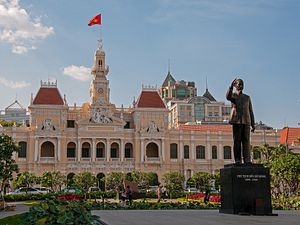If you want to know that Vietnam highly values its ties with China / Russia / India / South Africa there are plenty of newspapers which will tell you that, and in English. If you want to know what foreigners think about traffic or noodle soup, there are plenty of expat sections in those papers to tell you that too (on average once a week, for a decade).
But if you wanted a more nuanced take or to better understand a fast-changing Vietnam and how the country dealt with the new problems of development, there is now one less outlet. Ho Chi Minh City-based Thanh Nien News closed its online English news service last week.
When I was a Hanoi-based reporter I read it daily. It was one of the better reads, with a wider selection of stories, more original reporting and more investigative work. The pace of in-depth pieces slowed in recent times.
However, it wasn’t this investigative work that shuttered it in communist Vietnam last week after 12 years, as some have suggested. It was simple finance, not censorship. It made no money and its struggling parent company Bao Thanh Nien, the Vietnamese language version, could no longer support it.
I wrote in the Asia Sentinel that the Vietnamese newspaper business is struggling thanks to increased competition from online sources and foreign news. For business in the West the move to online has been tough to monetize effectively, but in Vietnam it’s been complicated by the fact that fewer people are turning to local news as suspicion of the Party line increases and more varied outlets, such as unsanctioned blogs, proliferate.
At the same time, all papers are ostensibly state-owned, so what’s the problem?
Given the number of lugubrious industries the government already props up, why not its propaganda efforts, too?
Some papers are still government supported, generally those closer to the Party and governing bodies whilst those like Thanh Nien, owned by the Youth League, are not. Those often-blunt propagandistic tools are rather obviously government-sponsored; no profit-making venture could consistently run copy that dull.
Yet just as English speakers have lost one window into Vietnam the government does not seem to put much effort into getting its viewpoint across in anything more than standard-issue bureaucratese at a time when Vietnam has been seeking more and varied international engagement. China’s enormous propaganda budget stretches to Times Square billboards in comparison. The sad thing is that China’s efforts like the China Daily and China Watch are as dull as communist boilerplate anywhere or, as I wrote the other month here, “evidence less of pernicious Chinese influence than a capitalist-sized bank balance and communist-style marketing plan.”
Thanh Nien was no propaganda tool, it was far too interesting for that and it will be missed.

































